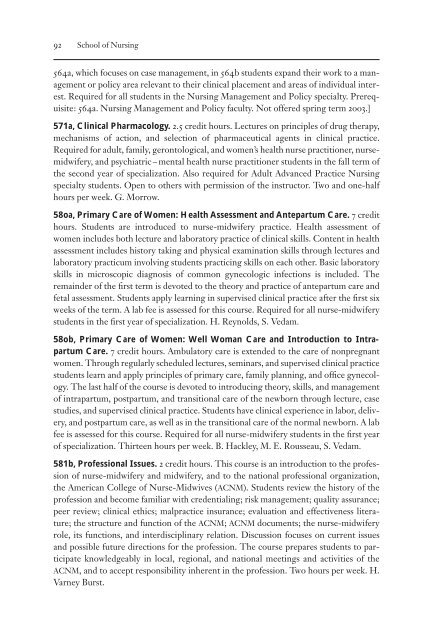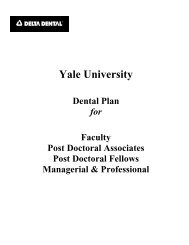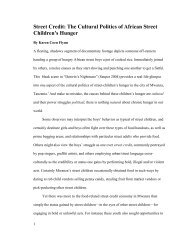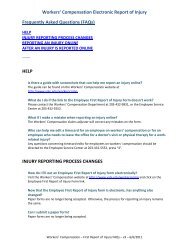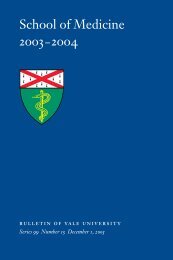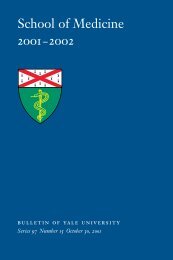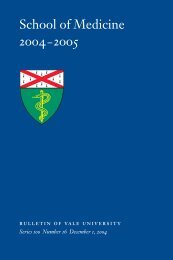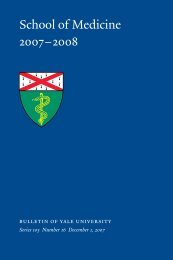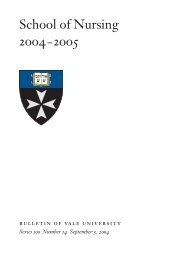92 School of Nursing564a, which focuses on case management, in 564b students expand their work to a managementor policy area relevant to their clinical placement and areas of individual interest.Required for all students in the Nursing Management and Policy specialty. Prerequisite:564a. Nursing Management and Policy faculty. Not offered spring term 2003.]571a, Clinical Pharmacology. 2.5 credit hours. Lectures on principles of drug therapy,mechanisms of action, and selection of pharmaceutical agents in clinical practice.Required for adult, family, gerontological, and women’s health nurse practitioner, nursemidwifery,and psychiatric–mental health nurse practitioner students in the fall term ofthe second year of specialization. Also required for Adult Advanced Practice Nursingspecialty students. Open to others with permission of the instructor. Two and one-halfhours per week. G. Morrow.58oa, Primary Care of Women: Health Assessment and Antepartum Care. 7 credithours. Students are introduced to nurse-midwifery practice. Health assessment ofwomen includes both lecture and laboratory practice of clinical skills. Content in healthassessment includes history taking and physical examination skills through lectures andlaboratory practicum involving students practicing skills on each other. Basic laboratoryskills in microscopic diagnosis of common gynecologic infections is included. Theremainder of the first term is devoted to the theory and practice of antepartum care andfetal assessment. Students apply learning in supervised clinical practice after the first sixweeks of the term. A lab fee is assessed for this course. Required for all nurse-midwiferystudents in the first year of specialization. H. Reynolds, S. Vedam.58ob, Primary Care of Women: Well Woman Care and Introduction to IntrapartumCare. 7 credit hours. Ambulatory care is extended to the care of nonpregnantwomen. Through regularly scheduled lectures, seminars, and supervised clinical practicestudents learn and apply principles of primary care, family planning, and office gynecology.The last half of the course is devoted to introducing theory, skills, and managementof intrapartum, postpartum, and transitional care of the newborn through lecture, casestudies, and supervised clinical practice. Students have clinical experience in labor, delivery,and postpartum care, as well as in the transitional care of the normal newborn. A labfee is assessed for this course. Required for all nurse-midwifery students in the first yearof specialization. Thirteen hours per week. B. Hackley, M. E. Rousseau, S. Vedam.581b, Professional Issues. 2 credit hours. This course is an introduction to the professionof nurse-midwifery and midwifery, and to the national professional organization,the American College of Nurse-Midwives (ACNM). Students review the history of theprofession and become familiar with credentialing; risk management; quality assurance;peer review; clinical ethics; malpractice insurance; evaluation and effectiveness literature;the structure and function of the ACNM; ACNM documents; the nurse-midwiferyrole, its functions, and interdisciplinary relation. Discussion focuses on current issuesand possible future directions for the profession. The course prepares students to participateknowledgeably in local, regional, and national meetings and activities of theACNM, and to accept responsibility inherent in the profession. Two hours per week. H.Varney Burst.
Course Listings 93583a, Introduction to Nurse-Midwifery Primary Care. 2 credit hours. This courseintroduces nurse-midwifery students to the concepts of health promotion and screening,as well as to the primary care management of selected common health conditions affectingwomen. Required for all nurse-midwifery students in the first year of specialization.Two hours per week. B. Hackley, M. E. Rousseau.6o7b, Pathophysiology and Management of Common Adult Clinical Problems I. 4credit hours. This course provides a basis for predicting vulnerability for common clinicalproblems (cardiovascular, respiratory, hematologic, and immunologic) that occur asa result of illness or outcome of treatment. Assessment, management, and evaluation areemphasized. Normal physiology, pathophysiology, and pharmacological management ofthese conditions are included. Required for all acute care nurse practitioner and cardiovascularclinical nurse specialist students in the first year of specialization. Four hours perweek. Adult Advanced Practice Nursing faculty.6o9a, Assessment of the Acutely and Critically Ill Client. 1.5 credit hours. This courseprovides comprehensive content necessary in the assessment of the acutely or criticallyill patient. Emphasis is on examination of the cardiovascular and respiratory systems,based on complex interpretations from laboratory and technical findings. Required forall acute care nurse practitioner and cardiovascular clinical nurse specialist students inthe first term of specialization. The first seven weeks of the course may be taken for 0.7credit hours as an elective by students in any specialty who have an interest in electrocardiographic(ECG) interpretation. One and one-half hours per week. D. Chyun.61oa, Advanced Assessment. 0.6 credit hours. Practicum concentrates on developmentof a systematic methodology of identifying patients’ needs for health care. Historytaking, physical examination, diagnostic studies and interpretation, analysis of medicaland <strong>nursing</strong> diagnoses, and documentation form the basis of this first clinical course.Selected clinical problems of hospitalized patients in the acute care setting are studiedin the context of case conferences. Physical diagnosis rounds with physician preceptorshipare included. Required for all clinical nurse specialist and acute care nurse practitionerstudents in the first year of specialization. Seven hours per week for eight weeks.J. Coviello.611a, Conceptual Basis of Nursing Practice. 2 credit hours. Through the discussionof concepts and theories in <strong>nursing</strong> and other disciplines, this course facilitates formationof a conceptual basis for advancing knowledge and practice. Required for all adultadvanced practice <strong>nursing</strong> clinical nurse specialist and acute care nurse practitioner studentsin the first year of specialization. Two hours per week. M. Knobf.612b, Advanced Specialty Practicum I. 3–4 credit hours. This practicum provides studentswith direct care experience with their special population (cardiovascular, gerontological,oncology). The focus of the practicum is on assessment and subsequent managementof selected problems for a caseload of patients in acute, ambulatory, and/orlong-term settings. During clinical conferences students present cases, formulate clinicaldiagnoses, and discuss management strategies for patients within their electedspecial population. Required for all students in the first year of specialization. Nine hours
- Page 1 and 2:
School of Nursing2002-2003bulletin
- Page 3 and 4:
School of Nursing2002-2003bulletin
- Page 5 and 6:
RayTompkinsHouseLynw od PlaceHi lsi
- Page 7 and 8:
ContentsA Message from the Dean 7Ca
- Page 9 and 10:
A Message from the DeanCatherine Ly
- Page 11 and 12:
The President and Fellows of Yale U
- Page 13 and 14:
Faculty 11faculty* Ivy Marie Alexan
- Page 15 and 16:
Faculty 13Virginia Henderson, 1897-
- Page 17 and 18:
Faculty 15Ronald Angoff, m.d., Asso
- Page 19 and 20:
Faculty 17Stephen Malcolm Bowers, m
- Page 21 and 22:
Faculty 19Alyson Bochow Cohen, m.s.
- Page 23 and 24:
Faculty 21Kathleen Marie Demers, m.
- Page 25 and 26:
Faculty 23Carolyn Miller Federici,
- Page 27 and 28:
Faculty 25Marci Ann Garafalo, m.s.n
- Page 29 and 30:
Faculty 27Robert Wentworth Hill, m.
- Page 31 and 32:
Faculty 29Linda Kowalczuk, m.s., Cl
- Page 33 and 34:
Faculty 31Thomas J. McMahon, ph.d.,
- Page 35 and 36:
Faculty 33Moira Kathleen O’Neill,
- Page 37 and 38:
Faculty 35Monica Roosa-Ordway, m.s.
- Page 39 and 40:
Faculty 37Barney S. Spivack, m.d.,
- Page 41 and 42:
Faculty 39Elizabeth Arquin Walker,
- Page 43: Faculty and Staff 41Elizabeth Willi
- Page 46 and 47: 44 School of NursingIn November 199
- Page 48 and 49: CentersCenter for Excellence in Chr
- Page 51: Academic ProgramsPaula Milone-Nuzzo
- Page 54 and 55: 52 School of Nursinggeneral enrollm
- Page 56 and 57: 54 School of NursingInternational s
- Page 58 and 59: 56 School of NursingArticulated Mas
- Page 60 and 61: 58 School of Nursingthe specialty a
- Page 62 and 63: 60 School of NursingYear OneRequire
- Page 64 and 65: 62 School of Nursingadult, family,
- Page 66 and 67: 64 School of NursingDuring the fina
- Page 68 and 69: 66 School of NursingYear TwoRequire
- Page 70 and 71: 68 School of NursingYear OneRequire
- Page 72 and 73: 70 School of NursingThe course plan
- Page 74 and 75: 72 School of Nursingand advanced pr
- Page 76 and 77: 74 School of Nursingpsychiatric-men
- Page 79 and 80: Doctor of Nursing Science Programai
- Page 81 and 82: Doctor of Nursing Science Program 7
- Page 83 and 84: Doctor of Nursing Science Program 8
- Page 85: Postdoctoral Training Program 83qua
- Page 88 and 89: 86 School of Nursing[923a, Current
- Page 90 and 91: 88 School of Nursing512c, Clinical
- Page 92 and 93: 90 School of Nursingresearch plans.
- Page 96 and 97: 94 School of Nursingper week for ac
- Page 98 and 99: 96 School of Nursingpractitioner, f
- Page 100 and 101: 98 School of Nursingdevelopment are
- Page 102 and 103: 100 School of Nursing721a/b, Schola
- Page 104 and 105: 102 School of Nursingmanagement of
- Page 106 and 107: 104 School of Nursing769a, Advanced
- Page 108 and 109: 106 School of Nursing8o3a/b, Oncolo
- Page 110 and 111: 108 School of Nursing827a, Pathophy
- Page 112 and 113: 110 School of Nursingassumption und
- Page 114 and 115: 112 School of Nursing9o3a, Measurem
- Page 116 and 117: 114 School of Nursing[921b, Seminar
- Page 119 and 120: General Informationtuition, special
- Page 121 and 122: General Information 1192. If the ch
- Page 123 and 124: General Information 121As an altern
- Page 125 and 126: General Information 123include Ethe
- Page 127 and 128: General Information 125In addition,
- Page 129 and 130: General Information 127Eligibility
- Page 131 and 132: General Information 129The School o
- Page 133: General Information 131OISS by subs
- Page 136 and 137: 134 School of NursingThe Connecticu
- Page 138 and 139: 136 School of Nursingmedical and pe
- Page 140 and 141: 138 School of Nursingcare, and home
- Page 142 and 143: 140 School of NursingConnecticut Ch
- Page 144 and 145:
142 School of NursingInternal Medic
- Page 146 and 147:
144 School of NursingRehabilitation
- Page 149 and 150:
University ResourceslibrariesThe ma
- Page 151 and 152:
University Resources 149may use the
- Page 153 and 154:
Candidates for Degree of Masterof S
- Page 155 and 156:
Master’s Degree Candidates 153Sar
- Page 157 and 158:
Distribution of GraduatesAlumni rec
- Page 159 and 160:
The Work of Yale UniversityThe work
- Page 161 and 162:
Index of CoursesAdult Development:
- Page 163 and 164:
Index of Courses 161Oncology Sympto
- Page 165 and 166:
The University is committed to basi


